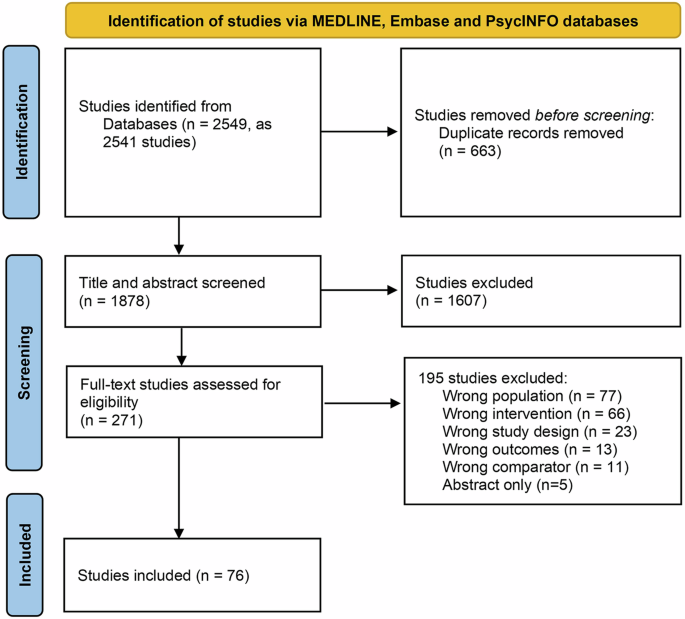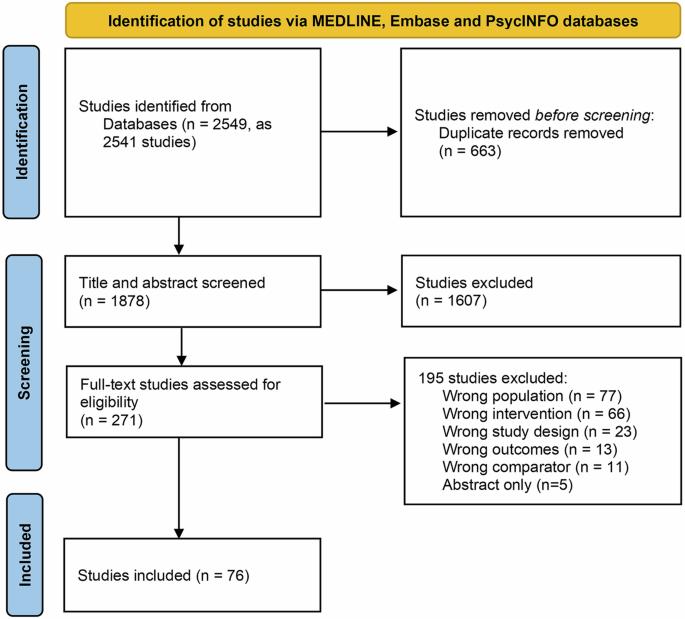Systematic review and meta-analysis of standalone digital interventions for cognitive symptoms in people without dementia
IF 12.4
1区 医学
Q1 HEALTH CARE SCIENCES & SERVICES
引用次数: 0
Abstract
Cognitive symptoms are prevalent across neuropsychiatric disorders, increase distress and impair quality of life. Self-guided digital interventions offer accessibility, scalability, and may overcome the research-to-practice treatment gap. Seventy-six trials with 5214 participants were identified. A random-effects meta-analysis investigated the effects of all digital self-guided interventions, compared to controls, at post-treatment. We found a small-to-moderate positive pooled effect on cognition (k = 71; g = −0.51, 95%CI −0.64 to −0.37; p < 0.00001) and mental health (k = 30; g = −0.41, 95%CI −0.60 to −0.22; p < 0.0001). Positive treatment effects on fatigue (k = 8; g = −0.27, 95%CI −0.53 to −0.02; p = 0.03) and quality of life (k = 22; g = −0.17, 95%CI −0.34 to −0.00; p = 0.04) were only marginally significant. No significant benefit was found for performance on activities of daily living. Results were independent of control groups, treatment duration, risk of bias and delivery format. Self-guided digital transdiagnostic interventions may benefit at least a subset of patients in the short run, yet their impact on non-cognitive outcomes remains uncertain.


针对无痴呆症患者认知症状的独立数字干预措施的系统回顾和荟萃分析
认知症状是神经精神疾病的普遍现象,会增加患者的痛苦并影响其生活质量。自我指导的数字干预具有可访问性和可扩展性,可以克服从研究到实践的治疗差距。本研究确定了 76 项试验,共有 5214 人参与。随机效应荟萃分析调查了与对照组相比,所有数字自我指导干预在治疗后的效果。我们发现,对认知(k = 71;g = -0.51,95%CI -0.64至-0.37;p <;0.00001)和心理健康(k = 30;g = -0.41,95%CI -0.60至-0.22;p <;0.0001)有小至中等程度的积极综合效应。对疲劳(k = 8;g = -0.27,95%CI -0.53至-0.02;p = 0.03)和生活质量(k = 22;g = -0.17,95%CI -0.34至-0.00;p = 0.04)的积极治疗效果仅略有显著性。在日常生活活动能力方面没有发现明显的益处。研究结果与对照组、治疗持续时间、偏倚风险和实施形式无关。在短期内,自我指导的数字化跨诊断干预至少可以使一部分患者受益,但其对非认知结果的影响仍不确定。
本文章由计算机程序翻译,如有差异,请以英文原文为准。
求助全文
约1分钟内获得全文
求助全文
来源期刊

NPJ Digital Medicine
Multiple-
CiteScore
25.10
自引率
3.30%
发文量
170
审稿时长
15 weeks
期刊介绍:
npj Digital Medicine is an online open-access journal that focuses on publishing peer-reviewed research in the field of digital medicine. The journal covers various aspects of digital medicine, including the application and implementation of digital and mobile technologies in clinical settings, virtual healthcare, and the use of artificial intelligence and informatics.
The primary goal of the journal is to support innovation and the advancement of healthcare through the integration of new digital and mobile technologies. When determining if a manuscript is suitable for publication, the journal considers four important criteria: novelty, clinical relevance, scientific rigor, and digital innovation.
 求助内容:
求助内容: 应助结果提醒方式:
应助结果提醒方式:


